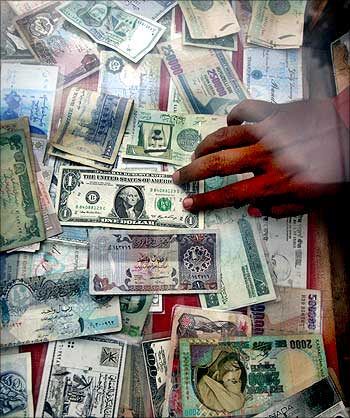 | « Back to article | Print this article |
 Backed by projected strong growth and inflow of investments, the Indian rupee has appreciated by 13.7 per cent against the Japanese yen and 12.8 per cent against the euro over the past 11 months, Singapore’s DBS banking group said on Monday.
Backed by projected strong growth and inflow of investments, the Indian rupee has appreciated by 13.7 per cent against the Japanese yen and 12.8 per cent against the euro over the past 11 months, Singapore’s DBS banking group said on Monday.
It has however declined 6.1 per cent in value against the US dollar from July 2014 to June this year, as the greenback has appreciated against Asia’s 10 currencies on its own economic strength.
Giving performances of Asian currencies, David Carbon, managing director for economic and currency research at DBS, said the rupee has appreciated by 6.6 per cent from July 2014 to this month against the Japanese yen, euro and USD combined.
The combined 10 Asian currencies have also appreciated by 6.6 per cent against the yen, euro and USD put together over the same period.
Currencies from China, Hong Kong, South Korea, Taiwan, Indonesia, Singapore, Malaysia, Philippines, Thailand and India had, combined together, appreciated by 13.7 per cent against the yen and 12.8 per cent against euro.
However, they lost in value by 6.1 per cent against the American currency.
Individually, the gain/loss figures are the same for the Indian currency vis-a-vis others.
"Asian currencies are too strong," Carbon told reporters during media briefing today, citing their performances against the yen, euro and USD.
He said the Asian currencies should soften or else there would be pressure on the region’s economies.
Asia’s combined economic growth is forecast at 6.25 per cent this year. Comparatively, US growth is forecast at 2.2 per cent, Japan 1.2 per cent and Europe 0.9 per cent during for the year.
Asia is driving the global growth and not the US, he pointed out. "For every dollar of growth the US puts on the global table, Asia now puts out $2.50," said Carbon.
Reminding that ‘too strong Asian currencies’ were not good, he said "Central banks (in the region) are shooting themselves in the foot."
He also reminded Asian economies to invest at home from their surpluses. Except for India and Indonesia, Asian countries have been running surpluses since 1998.
"Stop running surpluses, start running deficits. Stop investing in US Treasuries and start investing at home, where the income-lifting capital equipment and infrastructure is desperately needed," said Carbon.
Current account surpluses are standing in the way of greater domestic investment in all Asian countries save for Indonesia and India, said Carbon, adding, "Asia’s investment growth has slowed to a crawl".
After averaging 15 per cent per year for decades, the 10 Asian countries’ real investment growth has slowed from an 11-odd per cent pace in 2008 to four per cent in 2013 and three per cent last year.
If the Asian countries ran deficits of 2-3 per cent of the gross domestic product, domestic investment could be 8-9 nine per cent of GDP higher than it currently is.
"That’s a boatload of investment dollars that could be improving Asia’s infrastructure, raising Asia’s growth rates and lifting Asian incomes," he said.
Image: The combined 10 Asian currencies have also appreciated by 6.6 per cent against the yen, euro and USD put together. Photograph: Reuters